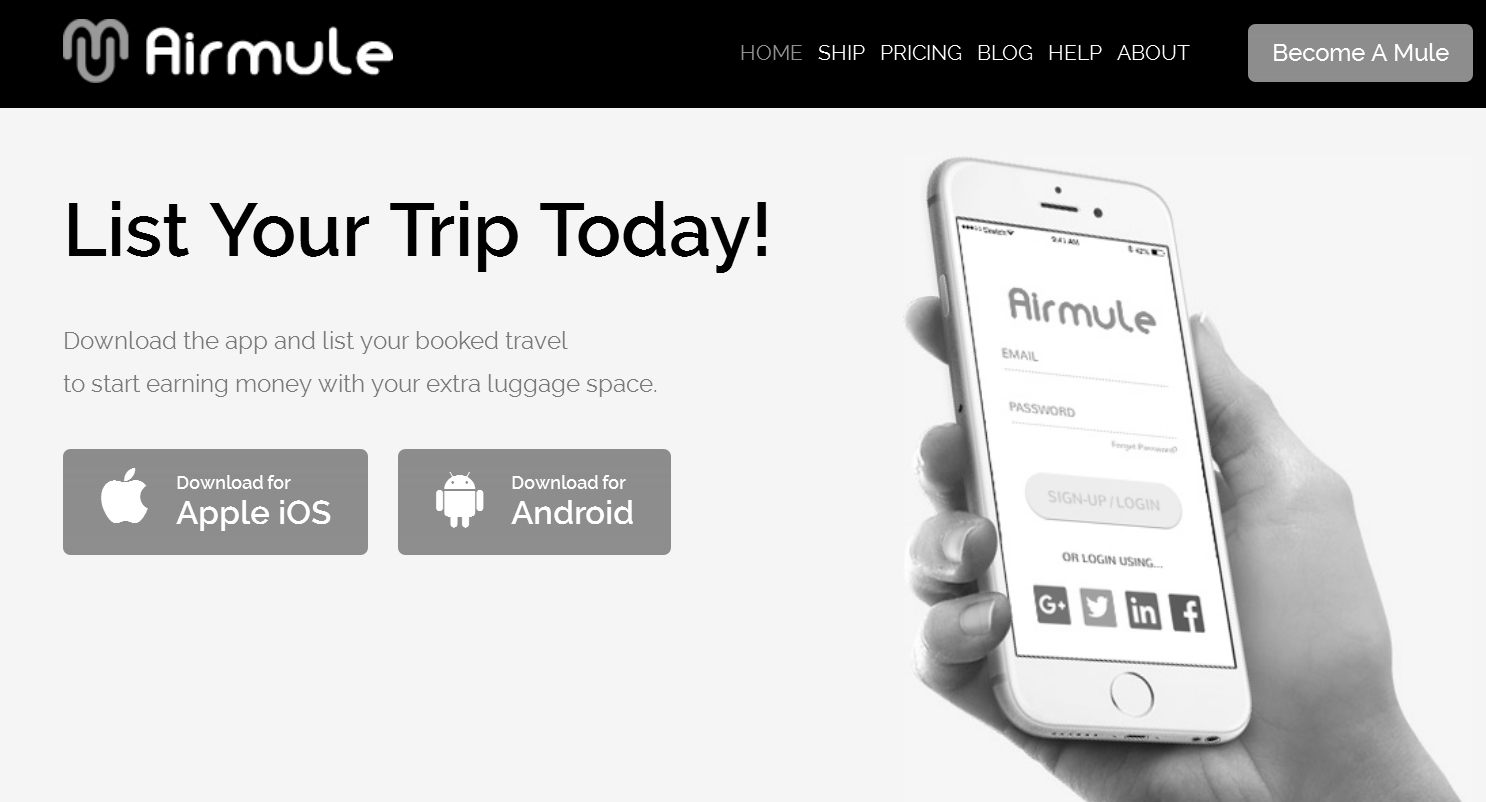It’s doubtful the creators of Airmule intended the company’s name to bring drug mules to mind, but the association is unavoidable. That’s unfortunate from a branding standpoint. But it’s a useful link nevertheless, as Airmules and drug mules perform essentially the same service. According to Airmule:
Whether across the country or the world, Airmule connects people to safely deliver packages anytime, anywhere at low rates and in less time. Airmule is the easiest way for people who list their trip to earn money with their extra luggage space.
More specifically, Airmule is a mobile app that connects travelers with extra room in their bags with shippers who need parcels picked up in the travelers’ departure cities and dropped off in their destination cities.
Would-be mules list their upcoming travel itineraries on the app. Shippers then contact the mules and arrange to have their parcels picked up or delivered. After which, the mule is paid for his services. It’s an online transaction that will be familiar and comfortable to anyone who uses Uber or TaskRabbit or similar apps.
It’s a neat application of a fundamental strategy of the sharing economy: Make use of under- and unused resources. In this case, the underutilized resource is shipping capacity. Every air traveler is allowed a fixed amount of pounds and cubic inches for their bags, before incurring surcharges for excess weight or size. Any unused bag capacity amounts to a lost opportunity to transport more goods for free. That’s the traveler side of the equation.
On the shipper side of the equation, there are the many companies and organizations that routinely send documents and small parcels to customers, employees, and business partners in other cities. To meet that demand, the likes of UPS, FedEx, and DHL operate extensive delivery networks, with their own fleets of trucks and cargo aircraft, and sophisticated tracking systems. There are also many smaller companies and individuals with the same shipping needs, but less robust budgets. That appears to be the market Airmule is targeting.
Travel the World for Free?
An extended blog post on the Airmule site, entitled “On Being A Mule (or) How to Travel the World For Free,” describes in detail one mule’s shipping experience, largely offsetting the cost of his trip to China by earning $625 for hand-delivering 14 items.
But even using his full allocation of checked bags for shippers’ goods, he earned less than the cost of his ticket, never mind the costs of accommodations in China.
And reading between the lines, it’s clear that he invested significant time and effort in picking up and delivering the shippers’ parcels, which included purses, phones, and beauty products.
Traveling the world for free, in other words, probably isn’t a realistic expectation.
Don’t Sell Your FedEx Stock
Airmule will never do to the major courier services what Uber is doing to traditional taxi companies. But there could be a place for it alongside UPS and FedEx. And that creates an opportunity for motivated flyers to turn their trips into revenue-producers.
Reader Reality Check
Interested?
After 20 years working in the travel industry, and almost that long writing about it, Tim Winship knows a thing or two about travel. Follow him on Twitter @twinship.


Maybe I’m paranoid, but… Ever have to answer the “has anyone given you anything to transport” question in the airport? What would I say? If getting pulled aside for extra screening because something came up on the x-ray, how is it going to look when I don’t know what I’ve really got in my bag? The website says I can inspect the package before taking it, but am I going to disassemble something to make sure nothing is inside. Would someone trying to get drugs into the country use me as a real “mule”. Not worth the risk. If all I would be carrying were documents I would do it, but not packages. My personal choice is to minimize any potential problems while traveling, and don’t want to get in any uncomfortable situations with the TSA that I can avoid.
Just be honest, and state yes. The on-board courier industry is decades old. Fedex and other offer on-board courier services today. Just inspect every item and don’t take anything you don’t want to.